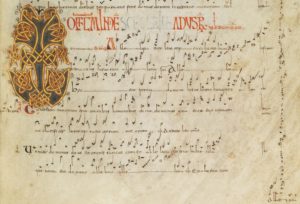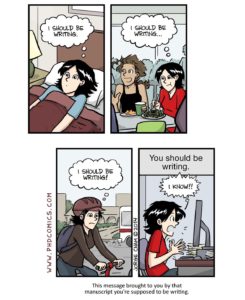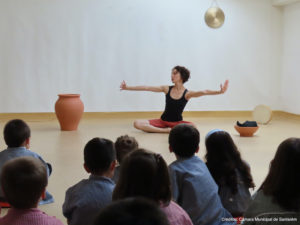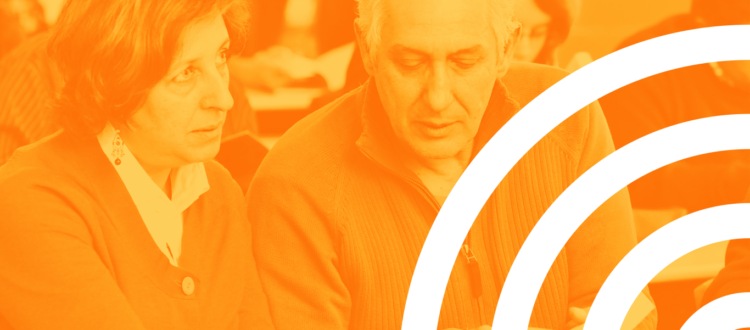CESEM na Escola de Verão FCSH
Music Palaeography. An Overview on Iberian Music Manuscripts (10th – 16th cent.)
 This course offers an overview on the changes occurred to music writing in the Iberian Peninsula from the tenth to the mid-sixteenth centuries. Firstly, the Old Hispanic notation was replaced by Aquitanian notation at the end of the eleventh century. Subsequently, the graphical appearance of Aquitanian notation changed due to the influence of the Gothic script. The first half of this course focuses on Old Hispanic notation but we also briefly introduce Catalonian notation and its peculiarities. In addition to the analysis of the first ‘neumes’ (that is, the graphical shapes employed to represent music in early notations), we will make an excursion in the world of Visigothic cryptography, which was employed in notarial deeds and was shaped reusing some symbols commonly found in Old Hispanic notation. In the second half of the course we discuss Gregorian manuscripts in Aquitanian notation, both from Spain and Portugal. In this section, we discuss in great detail the characteristics of the notation as found in Portuguese sources. This is a course on Iberian music palaeography but we will also touch upon nearby areas such as codicology, liturgy, and history since they allow us to better understand the contents of the surviving medieval musical sources. The active participation of the students is essential to the development of the course. The students will be strongly encouraged to comment and analyse the sources displayed (facsimiles, digital images). Students ‘will learn by doing’; they will learn to read medieval notations and become proficient at writing medieval notations as well as transcribing them into modern score. In addition to the palaeographical skills they adquire, students will be ready for greater challenges such as the preparation of critical editions of early music and philological analysis.
This course offers an overview on the changes occurred to music writing in the Iberian Peninsula from the tenth to the mid-sixteenth centuries. Firstly, the Old Hispanic notation was replaced by Aquitanian notation at the end of the eleventh century. Subsequently, the graphical appearance of Aquitanian notation changed due to the influence of the Gothic script. The first half of this course focuses on Old Hispanic notation but we also briefly introduce Catalonian notation and its peculiarities. In addition to the analysis of the first ‘neumes’ (that is, the graphical shapes employed to represent music in early notations), we will make an excursion in the world of Visigothic cryptography, which was employed in notarial deeds and was shaped reusing some symbols commonly found in Old Hispanic notation. In the second half of the course we discuss Gregorian manuscripts in Aquitanian notation, both from Spain and Portugal. In this section, we discuss in great detail the characteristics of the notation as found in Portuguese sources. This is a course on Iberian music palaeography but we will also touch upon nearby areas such as codicology, liturgy, and history since they allow us to better understand the contents of the surviving medieval musical sources. The active participation of the students is essential to the development of the course. The students will be strongly encouraged to comment and analyse the sources displayed (facsimiles, digital images). Students ‘will learn by doing’; they will learn to read medieval notations and become proficient at writing medieval notations as well as transcribing them into modern score. In addition to the palaeographical skills they adquire, students will be ready for greater challenges such as the preparation of critical editions of early music and philological analysis.
Data: 12 a 16 Julho
Horário: Monday to Friday 10h00 to 13h00 and 14 h00 to 16h00
Duração: 25h | 2 ECTS
Área: História da Arte e Estudos Artísticos
Docente responsável: Elsa De Luca
Ver evento aqui
Inscrição aqui
ACADEMIC WRITING: AN ESSENTIAL SKILL TO SURVIVE IN ACADEMIA. BEGINNERS
 This course aims to provide the essential training for academic writing in English to international students with little or no experience. The aim of this course is to empower students by providing them with the essential knowledge on grammar rules and conventions concerning academic writing in English and discuss how to choose the most appropriate style of writing. The teaching method is entirely based on practice exercises. In other words, students will learn by doing. After a concise explanation of the topic, students will be given a practice exercise which will be subsequently commented together in the classroom so that they can immediately receive the necessary feedback.
This course aims to provide the essential training for academic writing in English to international students with little or no experience. The aim of this course is to empower students by providing them with the essential knowledge on grammar rules and conventions concerning academic writing in English and discuss how to choose the most appropriate style of writing. The teaching method is entirely based on practice exercises. In other words, students will learn by doing. After a concise explanation of the topic, students will be given a practice exercise which will be subsequently commented together in the classroom so that they can immediately receive the necessary feedback.
Data: 19 a 23 Jul
Horário: 10h00 to 13h00
Duração: 15h
Área: Educação e Ensino
Docente responsável: Elsa De Luca
Ver evento aqui
Inscrição aqui
Academic Writing: An Essential Skill to Survive in Academia. Advanced
 ‘Publish or perish’ is a well-known say that gives a sense of the kind of expectations researchers should meet to survive in academia. This course provides the essential knowledge and training for academic writing in English. It is specifically targeted to scholars with some experience in academic writing who may have incurred in roadblocks or tend to procrastinate writing. Young writers who wish to be equipped with specific knowledge on the craft of academic writing could also benefit from it. Over the course of five days, we will discuss in detail the whole process of academic writing and break it down into sections. Laying out each section into smaller and more manageable tasks greatly increases the possibility of successful writing.
‘Publish or perish’ is a well-known say that gives a sense of the kind of expectations researchers should meet to survive in academia. This course provides the essential knowledge and training for academic writing in English. It is specifically targeted to scholars with some experience in academic writing who may have incurred in roadblocks or tend to procrastinate writing. Young writers who wish to be equipped with specific knowledge on the craft of academic writing could also benefit from it. Over the course of five days, we will discuss in detail the whole process of academic writing and break it down into sections. Laying out each section into smaller and more manageable tasks greatly increases the possibility of successful writing.
Data: 26 a 30 Jul
Horário: 10h00 to 13h00
Duração: 15h
Área: Educação e Ensino
Docente responsável: Elsa De Luca
Ver evento aqui
Inscrição aqui
Movimento e Escuta em sessões de orientações musicais para a Infância (0-5 anos): Técnicas, ferramentas e propostas
 Nas últimas décadas, a investigação tem revelado a importância das experiências musicais na infância e a sua relação com a posterior aprendizagem musical e desenvolvimento social e humano. O movimento expressivo participa naturalmente neste desenvolvimento musical. No entanto, a sua inclusão no âmbito do trabalho musical com crianças é pouco explorada, apesar da importância que lhe é atribuída por diferentes pedagogos (Dalcroze, Willems, Orff, Gordon). Este curso procura disponibilizar conhecimentos teóricos e práticos que permitam desenvolver um trabalho adequado e rico em termos de movimento em sessões de orientações musicais para a infância e, desta forma, contribuir para o desenvolvimento integral de cada criança.
Nas últimas décadas, a investigação tem revelado a importância das experiências musicais na infância e a sua relação com a posterior aprendizagem musical e desenvolvimento social e humano. O movimento expressivo participa naturalmente neste desenvolvimento musical. No entanto, a sua inclusão no âmbito do trabalho musical com crianças é pouco explorada, apesar da importância que lhe é atribuída por diferentes pedagogos (Dalcroze, Willems, Orff, Gordon). Este curso procura disponibilizar conhecimentos teóricos e práticos que permitam desenvolver um trabalho adequado e rico em termos de movimento em sessões de orientações musicais para a infância e, desta forma, contribuir para o desenvolvimento integral de cada criança.
Data: 30 Ago a 3 Set
Horário: 10h00 às 13h00 e das 17h00 às 19h00
Duração: 25h | 2 ECTS
Área: Educação e Ensino
Docente responsável: Helena Rodrigues
Docente: Ana Isabel Pereira
Docente: Rita Roberto
Ver evento aqui
Inscrição aqui
Viver o Canto: Um caminho sensível para o alargamento da sensibilidade e para a expressão vocal
 Este curso tem como objetivo possibilitar o reconhecimento da habilidade de cantar como sendo inerente a qualquer pessoa. Disponibilizará recursos práticos e conceitos teóricos que permitam o desenvolvimento da voz e da expressão do sujeito por meio do canto. Cantar é um ato incorporado e vivenciado no corpo. Cantar é uma experiência que favorece o ato criativo num processo social modulado pela situação na qual acontece. Esta prática artística envolve todos os sentidos, promove a integração pessoal, o alargamento da sensibilidade, o reconhecimento e a consciência de si e do outro, além de abarcar todo o ambiente que o cerca, fortalecendo o senso de comunidade.
Este curso tem como objetivo possibilitar o reconhecimento da habilidade de cantar como sendo inerente a qualquer pessoa. Disponibilizará recursos práticos e conceitos teóricos que permitam o desenvolvimento da voz e da expressão do sujeito por meio do canto. Cantar é um ato incorporado e vivenciado no corpo. Cantar é uma experiência que favorece o ato criativo num processo social modulado pela situação na qual acontece. Esta prática artística envolve todos os sentidos, promove a integração pessoal, o alargamento da sensibilidade, o reconhecimento e a consciência de si e do outro, além de abarcar todo o ambiente que o cerca, fortalecendo o senso de comunidade.
Data: 5 a 9 Jul
Horário: das 10h00 às 13h00
Duração: 15h
Área: Educação e Ensino
Docente responsável: Helena Rodrigues
Docente: Cecília Valentim
Ver evento aqui
Inscrição aqui

